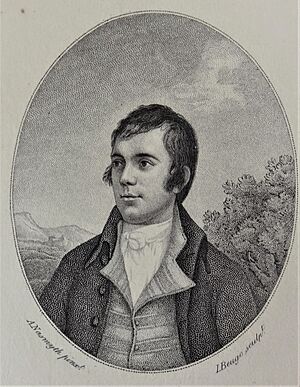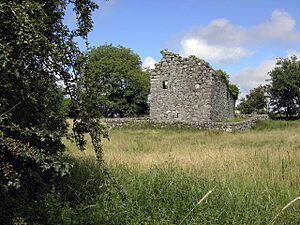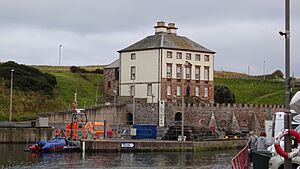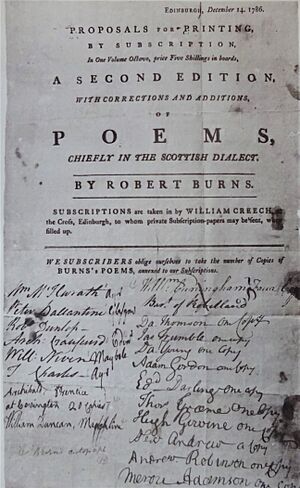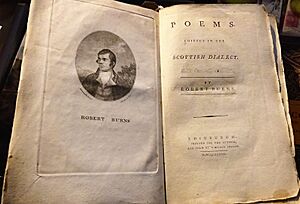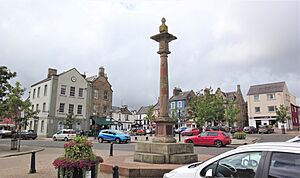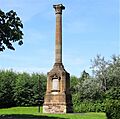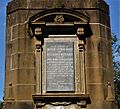Robert Ainslie (lawyer) facts for kids
Quick facts for kids
Robert Ainslie
|
|
|---|---|
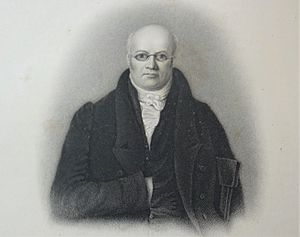
Robert Ainslie
|
|
| Born | 13 March 1766 |
| Died | 11 April 1838 Canongate, Edinburgh
|
| Occupation | Lawyer or Writer to the Signet |
Robert Ainslie (1766–1838) was a Scottish lawyer. He was a very close friend of the famous Scottish poet Robert Burns. They first met in Edinburgh at a social gathering. Ainslie even traveled with Burns on the first part of his trip through the Scottish Borders. Robert's father, also named Robert, was a lawyer and a land manager in Duns. Robert Ainslie married Jean Cunningham in 1798.
Contents
Ainslie's Early Life and Career
Robert Ainslie was born in 1766 at Berrywell House near Duns. His parents were Robert Ainslie and Magdeline Elliot. Robert Burns described his mother as "an excellent, sensible, cheerful, amicable old woman."
Robert had several brothers and a sister named Rachael. Robert Burns once wrote a short poem for Rachael. She was worried after hearing a sermon about the terrors of hell. Burns wrote on her Bible that the minister meant "guilty sinners," not "angels such as you." He wanted to make her feel better.
In 1788, at just 22 years old, Ainslie became a Writer to the Signet. This is a special type of lawyer in Scotland. He had studied law in Edinburgh before opening his own office. He also owned a country estate called Edingham near Dalbeattie.
People described Ainslie as a very polite and proper gentleman. He enjoyed reading and learning about science. Another writer, James Hogg, called him "honest Ainslie." Hogg also mentioned that Ainslie often fell asleep easily, even during important meetings! Later in his life, Ainslie became an Elder in the Church of Scotland.
Ainslie's Death
Robert Ainslie passed away in 1838 in Canongate, Edinburgh, when he was 71 years old. He is buried in St. Cuthbert's Churchyard. His memorial stone says he was born on January 13, 1767, and died on April 11, 1838. His wife, Isabella Munro, placed the memorial there.
Robert Burns and Ainslie's Friendship
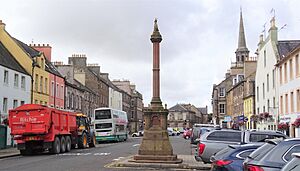
Robert Ainslie became a close friend of Robert Burns and another lawyer named Alexander Cunningham. They enjoyed spending time together, often sharing wine and listening to Burns's songs. They were also members of social groups like the Freemasons and the Crochallan Fencibles. These friendships began in January 1787 and lasted a long time.
Ainslie was 21 years old when he met Burns, who was seven years older. Ainslie bought two copies of Burns's famous book, Poems, Chiefly in the Scottish Dialect, published in 1787.
One sunny afternoon, Ainslie suggested they share a bottle of wine. Burns replied that it would be a waste of a beautiful day. Instead, they walked up Arthur's Seat, a large hill in Edinburgh. Ainslie later said that Burns was never more interesting or fun to be with than on that day.
The Border Tour of 1787
Ainslie joined Burns on a trip through the Scottish Borders. They left Edinburgh on May 5, 1787. In Eyemouth, both men became Royal Arch Masons. Ainslie paid a fee, but Burns was excused because of his talent as a poet. Burns had already joined the Freemasons in 1781.
When they reached Coldstream, Ainslie suggested Burns cross into England for the first time. Ainslie went first, then Burns followed. Burns knelt down and recited patriotic lines from his poem "The Cotter's Saturday Night." He spoke about his love for Scotland:
|
"O Scotia! my dear, my native soil! |
In Duns, Burns met Ainslie's family. He described Robert Ainslie senior as a very knowledgeable person, especially about farming and politics.
Sharing Secrets and Support
Burns introduced Ainslie to Agnes Maclehose, a woman he exchanged many letters with. Ainslie became Agnes's lawyer and often shared news about Burns with her. For example, it was Ainslie who told Agnes that Burns had gotten married.
Ainslie also helped Burns with some personal matters. He was involved when a woman named Jenny Clow took legal action against Burns. Jenny was Agnes's maid and had a son with Burns. This was a difficult situation for Ainslie, as he was friends with both Burns and Agnes.
Burns visited his son with Jenny Clow in Haddington. Agnes Maclehose told Ainslie to tell Burns that she would not even look out her window when he was in town. Burns understood this message.
In 1790, Ainslie reported that Burns had been ill with a serious throat infection called Quinsy.
Ainslie also played a role in sharing Burns's famous poem, 'Tam o'Shanter'. He gave a draft of the poem to Frances Dunlop and later sent the full text to Agnes Maclehose, who loved it. Ainslie later gave a handwritten copy of the poem to Sir Walter Scott.
In 1791, Ainslie visited Burns and his wife, Jean Armour, at their farm, Ellisland Farm. Ainslie was surprised by their simple life and Jean's manners. He also noted that Burns, who was an Excise Officer (a tax collector), would write beautiful poems one day and then seize illegal goods the next. This showed Ainslie the different sides of Burns's life.
Ainslie also confirmed that Burns was a secret member of the Society of the Friends of the People. This group worked for changes in government but was later stopped by the authorities.
After Burns's death, Ainslie, as a lawyer, visited Alexander Cunningham on behalf of Agnes Maclehose. He asked for the return of the letters Agnes had written to Burns.
Letters Between Burns and Ainslie
More than 20 letters from Robert Burns to Robert Ainslie still exist. However, Ainslie later got back all the letters he had sent to Burns and destroyed them. Burns often shared his private thoughts and feelings with Ainslie.
One famous letter, called the 'horse litter' letter from 1788, was made public by Ainslie. This caused some problems for Burns's reputation.
A collection of letters known as the 'Burns-Ainslie Correspondence' contains some letters and poems that have never been published before. These are copies, not in Burns's own handwriting.
Ainslie's Published Works
Robert Ainslie wrote and published several books:
- Practical Observations for the Landed and Agricultural Interest on the Question of Corn and Money (1816)
- A Father's Gift to his Children (1818), a book about religious devotion.
- The Life, Adventures & Serious Remonstrances of a Scotch Guinea Note (1826), a story told from the point of view of a banknote.
- Reasons for the Hope that is in Us (1831), another devotional book.
He also wrote for the Edinburgh Review and other publications.
Ainslie's Family Life
Robert Ainslie had a son with a girl from Innerleithen before he was married. Robert Burns joked about this, welcoming Ainslie to the "society of FATHERS!" Burns even suggested the son's middle name should be 'Burns'.
Ainslie married Jean Cunningham in 1798, two years after Burns died. They had one son and several daughters. Jean's father was Lieutenant Colonel James Cunningham. After Jean passed away at age 45, Ainslie married Isabella Munro. Burns once told Ainslie that he would make a "noble fellow" once he was married, saying he had enough sense to choose a good wife.
Images for kids
 | Leon Lynch |
 | Milton P. Webster |
 | Ferdinand Smith |


